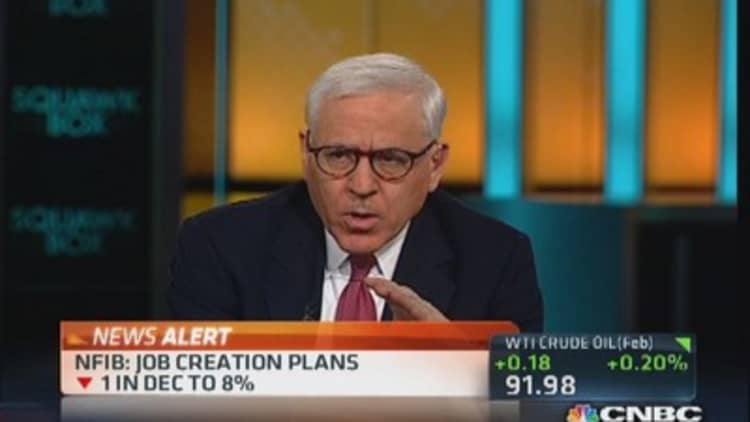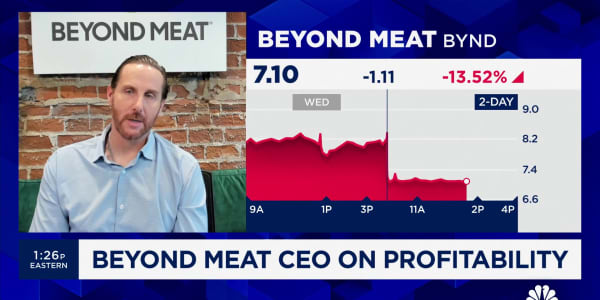The most common story line in private equity is that there are few bargains left. While selling or taking companies public has been easier, it's difficult for larger PE shops to buy or invest in a business because valuations have increased dramatically since the financial crisis.
(Read more: Blackstone: We're in an 'epic credit bubble')
But there's a slice of private equity that isn't too concerned about valuations: So-called middle market firms that focus on small and mid-sized companies, usually with under $500 million in annual revenues.

"Lower middle market business growth is getting stronger and that is great for those investing in the space," said Brett Palmer, president of The Small Business Investor Alliance, a trade association of lower middle market funds and investors in Washington, DC.
"Although it's a very competitive deal market, there are many more businesses in the lower middle market," added Palmer. "Although bigger, there are fewer choices at the very large end of the spectrum."
Palmer and others in middle market investing—many of whom gathered at an SBIA conference in snowy Manhattan Wednesday—have good reason to be bullish.
The growth of those smaller businesses are five times faster than the S&P 500 in 2013, according to new a new survey released by the National Center for the Middle Market Wednesday. And executives at the companies are mostly bullish for increased growth in 2014: they project 4.3 percent revenue and 2.2 percent employment growth over the next 12 months.
"The middle market continues to deliver consistently strong performance during both recessionary and growth periods of the overall economy," said Dr. Anil Makhija in a statement. Makhija is academic director at NCMM, a partnership of GE Capital and The Ohio State University Fisher College of Business.
(Read more: Apollo raises largest PE fund since financial crisis)
More private equity firms that focus on smaller opportunities are doing it through business development companies or "BDCs."
These publicly traded entities are run by private equity firms and invest mostly in the debt of smaller companies. Unlike standard PE funds, they are open to the public thanks to a legal exception to spur investment in smaller businesses. BDCs have gained in popularity as their relatively risky leveraged debt investments have performed well in the bull market, earning gains and dividends that combine to give investors high single or low double digit returns.
There have been 21 initial public offerings of BDCs since 2010 that raised $2.16 billion, according to data from Dealogic. Funds launched over the last 12 months include Garrison Capital, Harvest Capital Credit, Fifth Street Senior Floating Rate, Capitala Finance and American Capital Senior Floating.
Recent large BDC IPOs
| Issuer | Total Value ($M) | Pricing Date |
|---|---|---|
| THL Credit Inc | 203 | 4/21/2010 |
| Solar Senior Capital Ltd | 180 | 2/24/2011 |
| American Capital Senior Floating Ltd | 150 | 1/15/2014 |
| Stellus Capital Investment Corp | 138 | 11/7/2012 |
| Medley Capital Corp | 129 | 1/20/2011 |
| Golub Capital BDC Inc | 107 | 4/14/2010 |
| Solar Capital Ltd | 105 | 2/9/2010 |
| PennantPark Floating Rate Capital Ltd | 103 | 4/8/2011 |
| Horizon Technology Finance Corp | 100 | 10/28/2010 |
| New Mountain Finance Corp | 100 | 5/19/2011 |
| OFS Capital Corp | 100 | 11/7/2012 |
| WhiteHorse Finance LLC | 100 | 12/4/2012 |
| Fifth Street Senior Floating Rate Corp | 100 | 7/11/2013 |
Source: Source: Dealogic
Another increasingly popular avenue for small and mid-sized business investment is through the U.S. government's Small Business Investment Company program.
The U.S. Small Business Administration provides some capital alongside private equity firms, which manage the investment funds and take much of the risk. Together, the SBIC program has $19.8 billion invested in companies as of Dec.31 via 292 funds, up from $17 billion at the end of 2011 according to the most recent data available. That creates or sustains 26,129 jobs, the government says.
Javier Saade, the SBA's associate administrator for the office of investment, said at the SBIA conference Wednesday that he expected the government to increase its commitment to the program from $3 billion to $4 billion given high demand.
One believer of the SBIC program is Charles McCusker, a managing partner at Baltimore-based Patriot Capital.
"Valuations aren't as bubbly or frothy with smaller companies—there's more opportunity to find value," McCusker said. "I'm pretty optimistic about 2014...companies will be investing in growth."
The $550 million private equity firm manages five funds, three of which are through the SBIC program. Patriot focuses on businesses with between $30 million and $200 million in annual revenue and targets purchases that can grow by six or seven times gross earnings. McCusker acknowledges those smaller business inherently carry more risk, they can also carry higher return if managed correctly.
While more volatile, small firms have indeed produced strong gains compared to their larger counterparts in PE. According to data from PitchBook, buyout funds with less than $500 million in assets have outperformed those with more than $500 million in five of the last six years by their investor rate of return.
More money is likely to flow into the space. "While opportunities and returns for larger funds are scarcer with a much-appreciated Dow, opportunities remain in the middle market," said David Deutsch, president of David N. Deutsch & Co., a boutique investment bank that advises mid-sized private companies on mergers, acquisitions and financing.
"There are more private equity, BDC, SBIC, bank and commercial finance dollars in the space than ever."
—By CNBC's Lawrence Delevingne. Follow him on Twitter @ldelevingne.






